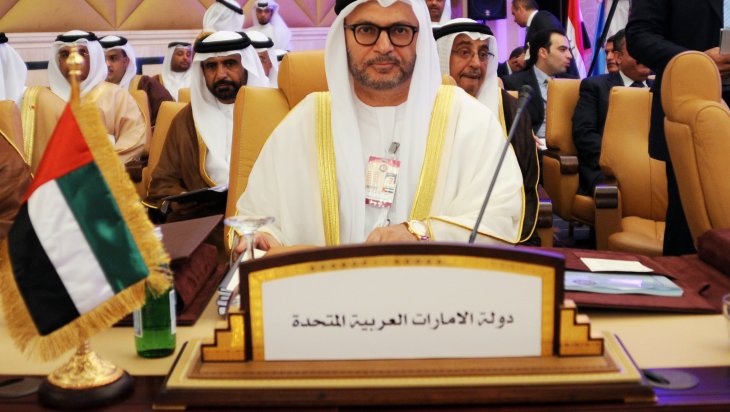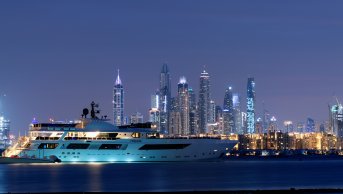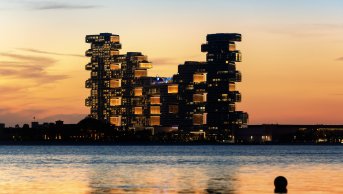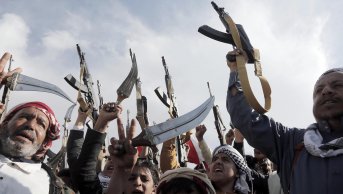UAE's Delusional Accusations Against Turkey's Presence in the Gulf

Repeated statements, made through direct press releases and Twitter posts, can become official opinion at some point. Case in point, how the United Arab Emirates (UAE) officials argue that Turkey's foreign policy toward the Middle East is destabilizing.The UAE Foreign Minister Anwar Gargash recently added a statement to his successive set of indictments against Turkey's role in the Middle East. Gargash, in an inescapably self-denying fashion, has repeatedly claimed that Turkish presence in the Middle East, and particularly, in Qatar, is destabilizing for the region. The phrase "destabilizing for the region" here actually means "anything that does not comply with the foreign policy objectives of the UAE."
In his eyes as well as in the eyes of the relevant UAE policymakers, Turkish military presence in Qatar plays a destabilizing role for the Middle East. However, it is unlikely that such an announcement would be made for any other country in the same situation. For instance, there are the U.S. and French military settlements and personnel located in the center of the UAE capital, Abu Dhabi. Here, the limits of comparative analysis are determined, not regarding the nature of the military bases, but whether they are the subject of criticism only.
Judging by the UAE's statements, the countries that are in the same position as Turkey are thought to contribute to peace and stability in the region. But in this case, the framing of Turkey’s regional role as destabilizing, without any rational basis and reasonable inference, reflects double standards. Therefore, an examination of how stability is defined is likely to provide a reason for how an actor becomes a destabilizing factor in the region. Statements from policymakers are important elements to understanding events that take place. The UAE foreign policymakers are well-educated people, who have spent a considerable amount of time in countries, such as the United States and the United Kingdom.
Members of the families, such as Al Nahyan, Al Maktoum and Al Otaiba, who have come to form the policymaking circles in the UAE over the years, include people who have a strong command of the diplomatic language. An observation would be that these talents come to the fore especially in the issues of defamation and image distortion. The efforts to justify a foreign policy discourse molded by double standards takes a large part of the daily life of these diplomats. The stark differences in the gap between what is said and what is done blur the efforts to legitimize them. This effort also weakens the credibility of foreign policy considerations.
The destabilization narrative
Looking at the accusations against Turkey, one of the prominent issues is destabilization. With a growing interest and excitement, Turkey continues to develop its economic and political relations with the Gulf countries, with whom it shares common historical, cultural and religious ties. Turkey raises the possibilities of cooperation, regardless of discrimination on any basis between the countries and peoples of the region. But here, because of delusional and intended reasons, Turkey is being portrayed as a destabilizing force. The phrases, constantly used by the UAE officials in the accusations, express the veiled consequences of the UAE's foreign policy. The Turkish military presence in Qatar did not cause the death of millions and the occupation of any Middle Eastern country.
However, the word destabilization will come short of characterizing the consequences of the UAE's foreign policy. The legitimation of an embargo, which targeted Qatar politically, militarily and financially, was again based on fictitious and deliberate reasons. The UAE and Saudi Arabia's intervention in Yemen, destroyed the country's territorial integrity, national will and future, besides further destabilizing the Middle East. Stability in the UAE's foreign policy means supporting forces that divide Middle Eastern countries like Yemen, Libya and Syria.
Therefore, relations established under democratic and political conventions are criticized and marginalized by the UAE, if its unfounded interests are threatened.It doesn’t stop there either. The destabilization story continued in full swing in the Middle East. In addition to the financial intervention into Qatar and military intervention into Yemen, the region has been dragged into a more unstable position than ever before due to the UAE's activities in Libya, Syria and Egypt. Could the breaking of democratic hopes for Egypt, buried down in 2013, not be seen as destabilization? What stability is the overthrowing of an elected president by soldiers, who then dismissed him and left him to die in a cell?
The situation is the same in Libya and Syria. Whoever opposes national legitimacy, democracy as a form of governance and stability in Libya and Syria is likely to stand with the UAE. Fighting the U.N.-recognized Government of National Accord (GNA), putschist Gen. Khalifa Haftar has over the years received financial, military and political support from the UAE. Haftar’s successive offensives on the Libyan capital Tripoli made both Libya and North Africa more unstable than ever before. It ought to be understood from Gargash's and the others' logic of stability, that the UAE contributes to the "stability" in Libya by channeling jet fuels, foreign fighters and other relevant military capabilities to the illegitimate forces and their leader. In the ongoing war in Syria, which is the most important reason for the instability of the Levant region, the UAE exacerbates instability by establishing financial, logistical and military relations with the Syrian regime, despite continuous warnings from the U.S. and Russia.
Delusional accusations as a strategy
From this point of view, it is an undeniable reality that UAE foreign policy has a destabilizing effect on the Middle East. However, the fact that it is presented as if it is the opposite, causes a lack of stability in foreign policy. It can be seen as natural that foreign policy moves that cannot be legitimized are generally justified by the marginalization and demonization of others. It can be thought that with the normalization agreement of the UAE with Israel, the room for maneuver in the foreign policy of the UAE is limited. The restriction of the maneuvering area also leads to increased marginalization practices and continued hysteria.
As a result, by using the accusations of breeding instability, the UAE is trying to open a space for itself in foreign policy. President Recep Tayyip Erdoğan and the Turkish delegation's visit to Kuwait after the death of the Emir of Kuwait and subsequent visits to Qatar due to developments in bilateral relations was not an act against the UAE. Nor, for that matter, was any statement about the UAE made during the visits. Nevertheless, the fact that Turkey has been targeted by the UAE's top foreign policymakers can be seen in the light of three consequences.
The first is while the UAE is planning to smear Turkey’s image with various accusations, it thinks that its foreign policy activities are not visible. The second is the fact that the UAE's foreign policy can survive only by generating out-of-nothing marginalizations. The third, and most striking one, is that the UAE’s accusations found a close-to-zero response in the Arab world, especially after the normalization agreement. Therefore, these accusations made by the UAE and the legitimacy mechanism in foreign policy cannot go beyond being imaginary.
This article was published in Daily Sabah website under the title of “UAE's Delusional Accusations Against Turkey's Existence in the Gulf ” on November 4, 2020.








